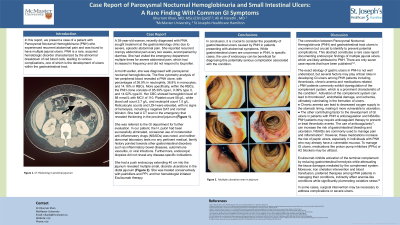Sunday Poster Session
Category: Small Intestine
P1260 - Case Report of Paroxysmal Nocturnal Hemoglobinuria and Small Intestinal Ulcers: A Rare Finding With Common GI Symptoms
Sunday, October 22, 2023
3:30 PM - 7:00 PM PT
Location: Exhibit Hall

Has Audio
- KK
Khurram Khan, MD, MSc(Epi)
McMaster University
Hamilton, ON, Canada
Presenting Author(s)
Khurram Khan, MD, MSc(Epi), Ali Al Harethi, MD
McMaster University, Hamilton, ON, Canada
Introduction: A patient with PNH who developed multiple jejunal ulcers is presented with a focus on elucidating the potential factors in her pathophysiology. PNH is a rare condition with complement-mediated cell damage that results in intravascular thrombosis, hemolysis and bone marrow failure. Although PNH is primarily known for its hematological manifestations, it can impact other organs, including the GI tract.
Case Description/Methods: A 39-year-old woman recently diagnosed with PNH presented to the GI clinic with sever episodic abdominal pain with radiological evidence of thickened proximal jejunum. One month earlier, PNH was diagnosed, based on flow cytometry findings. Labs also revealed pancytopenia, progressive for about 6 months with most recent hemoglobin of 88 mmol/L, with macrocytosis. The patient's platelets were 58 g/L and white blood cell count 2.7 g/L with a neutrophil count of 1.0 g/L. Reticulocyte counts and LDH were elevated, with no evidence of hemolysis including a negative DAT and normal bilirubin.
She reports a recurrent crampy abdominal pain every two weeks associated with diarrhea. She also has shortness of breath on minimal exertion and fatigue affecting her daily activities. She had multiple visits to the emergency department with abdominal pain, which became more frequent, severe and not abated with ibuprofen. She had a CT scan that revealed proximal jejunum thickening and was referred to GI to consider further evaluation with endoscopy. Her enteroscopy revealed multiple small, discrete ulceration 40 cm into the jejunum which biopsy confirm non-specific acute inflammation. She was managed with NSAID restrictions, eculizumab and transfusions as needed.
Discussion: The etiology of gastric ulcers in PNH is not well understood, but many factors including thrombosis, anemia and medications could be important. Activation of the complement system can lead to endothelial damage, subsequent ischemia, and ulcers. Chronic anemia can lead to decreased oxygen supply to the stomach lining, making it more susceptible to injury and ulceration. Anticoagulation to prevent thrombotic events and pain management with NSAIDs can also increase risks of bleeding and ulceration. Treatment options include blood transfusions, iron supplementation, and targeted therapy such as eculizumab, which inhibits the complement system. To manage GI ulcers, proton pump inhibitors (PPIs) or H2 blockers may also be prescribed.
Disclosures:
Khurram Khan, MD, MSc(Epi), Ali Al Harethi, MD. P1260 - Case Report of Paroxysmal Nocturnal Hemoglobinuria and Small Intestinal Ulcers: A Rare Finding With Common GI Symptoms, ACG 2023 Annual Scientific Meeting Abstracts. Vancouver, BC, Canada: American College of Gastroenterology.
McMaster University, Hamilton, ON, Canada
Introduction: A patient with PNH who developed multiple jejunal ulcers is presented with a focus on elucidating the potential factors in her pathophysiology. PNH is a rare condition with complement-mediated cell damage that results in intravascular thrombosis, hemolysis and bone marrow failure. Although PNH is primarily known for its hematological manifestations, it can impact other organs, including the GI tract.
Case Description/Methods: A 39-year-old woman recently diagnosed with PNH presented to the GI clinic with sever episodic abdominal pain with radiological evidence of thickened proximal jejunum. One month earlier, PNH was diagnosed, based on flow cytometry findings. Labs also revealed pancytopenia, progressive for about 6 months with most recent hemoglobin of 88 mmol/L, with macrocytosis. The patient's platelets were 58 g/L and white blood cell count 2.7 g/L with a neutrophil count of 1.0 g/L. Reticulocyte counts and LDH were elevated, with no evidence of hemolysis including a negative DAT and normal bilirubin.
She reports a recurrent crampy abdominal pain every two weeks associated with diarrhea. She also has shortness of breath on minimal exertion and fatigue affecting her daily activities. She had multiple visits to the emergency department with abdominal pain, which became more frequent, severe and not abated with ibuprofen. She had a CT scan that revealed proximal jejunum thickening and was referred to GI to consider further evaluation with endoscopy. Her enteroscopy revealed multiple small, discrete ulceration 40 cm into the jejunum which biopsy confirm non-specific acute inflammation. She was managed with NSAID restrictions, eculizumab and transfusions as needed.
Discussion: The etiology of gastric ulcers in PNH is not well understood, but many factors including thrombosis, anemia and medications could be important. Activation of the complement system can lead to endothelial damage, subsequent ischemia, and ulcers. Chronic anemia can lead to decreased oxygen supply to the stomach lining, making it more susceptible to injury and ulceration. Anticoagulation to prevent thrombotic events and pain management with NSAIDs can also increase risks of bleeding and ulceration. Treatment options include blood transfusions, iron supplementation, and targeted therapy such as eculizumab, which inhibits the complement system. To manage GI ulcers, proton pump inhibitors (PPIs) or H2 blockers may also be prescribed.
Disclosures:
Khurram Khan: Abbvie – Advisory Committee/Board Member.
Ali Al Harethi indicated no relevant financial relationships.
Khurram Khan, MD, MSc(Epi), Ali Al Harethi, MD. P1260 - Case Report of Paroxysmal Nocturnal Hemoglobinuria and Small Intestinal Ulcers: A Rare Finding With Common GI Symptoms, ACG 2023 Annual Scientific Meeting Abstracts. Vancouver, BC, Canada: American College of Gastroenterology.
